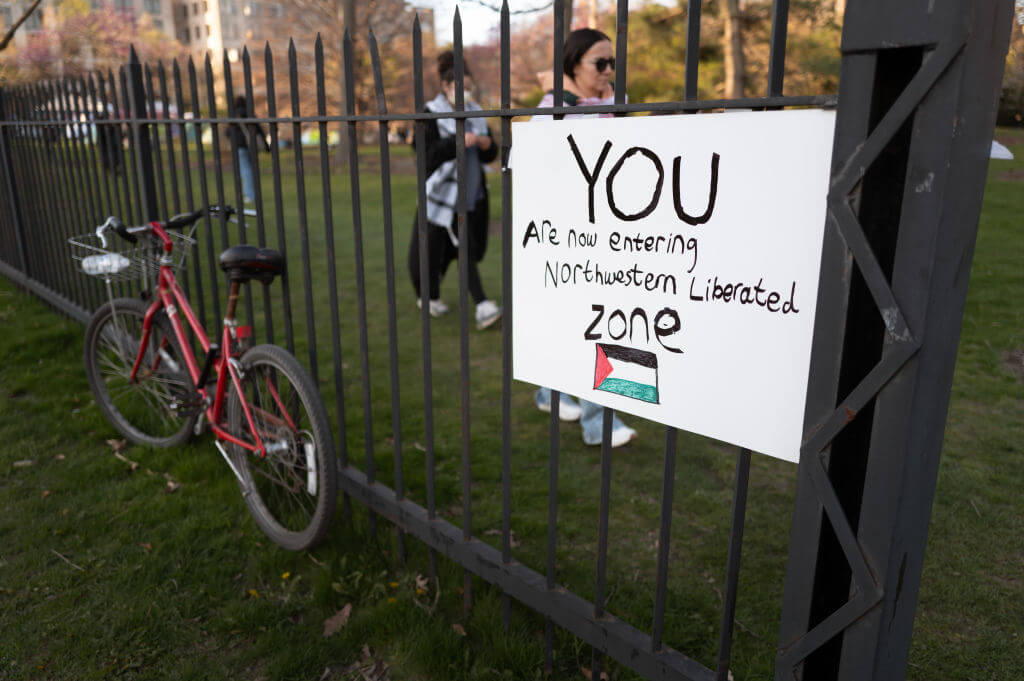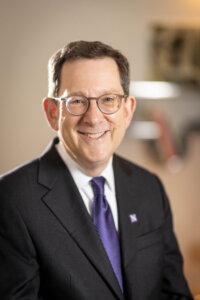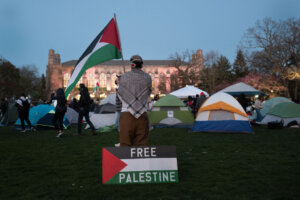Jewish president of Northwestern, under fire for making deal with protesters, is next to take hot seat in Congress
‘One of the things I love about being Jewish is our culture of rationality and tolerance’

Northwestern University President Michael Schill is the only Jewish leader scheduled to testify before Congress on Thursday. Photo by Scott Olson/Getty Images
EVANSTON, Illinois — Michael Schill, the Jewish president of Northwestern University, has in recent weeks been depicted as a devil with horns by pro-Palestinian protesters who set up a tent city on campus where passersby reported being called “dirty Jew” and “Zionist pig.”
He has also faced fierce calls for his resignation from the Anti-Defamation League and other Jewish nonprofits for making a deal with the protesters to remove their encampment in exchange for the university answering questions about its investments. The right-wing group Accuracy in Media put a mobile billboard outside his home and office for two days declaring him “Hamas’s favorite university president.” And on Monday, an anonymous student filed a second lawsuit accusing Northwestern of failing to protect Jewish students from hostility and antisemitism, calling the campus atmosphere “unbearable.”
Now Schill, who has been at Northwestern’s helm less than two years, is headed from the fire into the potential inferno, one of three university presidents slated to testify Thursday on Capitol Hill before the same committee whose interrogations cost their colleagues at Harvard and the University of Pennsylvania their jobs. He is the only Jewish leader on the docket — the others are Rutgers University President Jonathan Holloway, who has also been lambasted by Jewish groups for negotiating with protesters; and Michael V. Drake of UCLA, where pro-Israel counter-protesters attacked an encampment — and those who know him expect him to draw on Jewish values that he has described as “core to my identity.”

“One of the things I love about being Jewish is our culture of rationality and tolerance,” Schill, who is 65, wrote in a May 9 op-ed in the Chicago Tribune explaining his approach to the encampment. The agreement they reached, he added, “was possible because we sought to follow a set of principles, many of which I would argue are core to the tenets of Judaism.”
He called himself “a proud Jew who practices many of our rituals,” and that his family had “experienced antisemitism,” so that claims he was collaborating with antisemites “feel like personal affronts.”
Schill, who declined to be interviewed for this article, grew up in Schenectady, New York, where his father was president of the Brotherhood at Congregation Gates of Heaven, a Reform synagogue. He was the only Jewish student in his elementary school, and the first in his family to get a four-year degree when he graduated from Princeton in 1980; his father, Simon, worked in a clothing factory, and his mother, Ruth, was a nurse.
Schill’s great-grandfather was killed in a pogrom in Russia in the 1890s, and his aunts, uncles and cousins in Poland were taken to concentration camps four decades later. Some of those who survived settled in Israel, and Schill said in his Tribune column that he “grew up with a love for Israel, which remains today.”
The House Committee on Education and the Workforce, where Schill and his colleagues from Rutgers and UCLA will appear on Thursday, has become a dangerous battlefront in the propaganda war surrounding the actual war between Israel and Hamas.
A December hearing, in which the presidents of Harvard and the University of Pennsylvania hesitated about whether calling for the genocide of Jews would violate their free speech policies, is widely seen as leading to their resignations. Columbia University’s leader, Minouche Shafik, performed better only to return to a growing campus protest that sparked a nationwide movement.
The Republican committee chair, Rep. Virginia Foxx of North Carolina, has summoned Schill to D.C. this week to answer for what she calls his “surrender to the unlawful, pro-terror encampment” that “harassed, assaulted, and intimidated Jewish students.”
‘A model for how people can bridge difference’
Like many other university presidents, Schill has faced criticism from multiple corners since the early days after the deadly Oct. 7 terror attack on Israel. He made his first official statement about the massacre and the war it spawned in Gaza five days later, on Oct, 12, saying he was “repulsed, sickened and disappointed by what Hamas has done” with a “horrific and inhuman” attack‚ but also that Northwestern would not take a position on the conflict.
“The university does not speak for our faculty, students and staff on these matters – they have their own voices, and I would venture to say, there are no doubt differences among our students and faculty on what Hamas did and how Israel is responding,” he wrote. “For me to speak for them displaces their own freedom to speak.”
A group called Alums for Campus Fairness, quickly accused Schill of refusing to “define and denounce antisemitism.” In December, they ran a television ad during Northwestern football’s bowl game accusing the school of failing to protect its Jewish students.
I asked Schill about the ad campaign in March, when I interviewed him for the Evanston RoundTable, a local nonprofit newsroom where I am managing editor and reporter. His answer presaged his approach to the encampment.
“The two questions that I have always put foremost in my mind have been to protect our students and to protect the values of the university, of which free expression and academic freedom are paramount,” he told me.
“My approach also is one of believing that people of good will can always come to an understanding. We don’t have to agree. In fact, we might not agree with each other. But nonetheless, we should be able to talk to each other with respect and with empathy, and move the ball forward in support of joint objectives.”
Universities, he added, “should be a model for how people can bridge difference and polarization.”
While Foxx has likened the anti-Israel protesters to a “mob,” Schill wrote in his Tribune op-ed that the deal he struck was possible “because we chose to see our students not as a mob but as young people who were in the process of learning.”
The university started negotiating with protesters the first day the encampment went up last month, but Schill has said administrators “gave a flat no” to their demands that Northwestern divest from Israeli companies and end an academic program focused on Israeli innovation. The agreement that was struck on the fifth day included scholarships for five Palestinian undergraduates and an “affinity space” on campus for those from the Middle East and North Africa.
Northwestern’s faculty senate passed a resolution May 8 supporting “the general approach” that “led to the peaceful dissolution” of the encampment, saying the deal Schill struck “strongly reflects the values of our university.”
Schill, speaking on a public radio show, highlighted how his approach differed from schools like Columbia, Dartmouth, Yale and UCLA, where mass arrests of protesters led to backlash.
“We thought the best way to sustainably de-escalate the situation was to actually talk with our students,” he said. In a a video message explaining his decision to the community, he obliquely took on Representative Foxx, who he will face at Thursday’s hearing, saying: “I do take issue with calling our students a mob.”
“They’re young. They’re sometimes naive,” Schill said. So the best way to “achieve our educational mission is for us to engage in dialogue with them.”
‘Passionate about understanding all sides of an issue’
That approach does not surprise Sarah Gerecke, who was in Schill’s class at Princeton and was one of only six undergraduates who shared his selective major, urban studies. They’ve stayed in touch for the last 40 years, as Schill went on to Yale law school, did research on residential segregation, property law and community development, and, from 2015 until 2022, served as president of the University of Oregon in Eugene.
Gerecke said Schill always believed in the obligation of governments to help people society had failed — and that while they often argue about policy, he always makes space for respectful, productive discussion.
“We both took the space and the freedom, as college students, to explore opinions we may not actually agree with,” she told me in a recent interview, “but Mike was very passionate about understanding all sides of an issue, even if it was a side with which he had disagreed.
“I would say that he has continued consistently to believe that the heart of academic experience is to be able to explore ideas in a safe environment.”
Schill was not Northwestern’s first choice to replace Morton O. Schapiro, who retired in August 2022. He had been beaten out for the job by Rebecca Blank, chancellor of the University of Wisconsin-Madison.
But Blank was diagnosed with an aggressive cancer about a month before she was slated to take over, and the university soon announced Schill’s appointment. He quickly moved from Eugene, Oregon, to Evanston with Max, the young spaniel he rescued.
“Having been a first-generation student at a university that isn’t terribly unlike Northwestern allows me to empathize with our first-generation students here,” he told Northwestern Magazine last fall. “I understand some of the ‘fish out of water’ feeling. But I also know that what makes them perhaps not fit in initially is also something that’s going to give them strength.”

‘How we can get through this together’
On Northwestern’s campus, many people I interviewed said that they agree with Schill’s goal of building an environment where people can discuss their beliefs and opinions without being attacked. But many disagree on how to get there.
For Sari Eisen, the student president of Northwestern’s Hillel chapter, and Hillel Executive Director Michael Simon, protests to support Palestinian liberation have devolved too often into criticism of Jewish people who support Israel. They see chants like “intifada revolution” and “from the river to the sea” as calls for violence against Jews.
Students and faculty should feel free to criticize Benjamin Netanyahu’s government, they said, but protests go too far when there’s a poster crossing out the Star of David, as he saw in Northwestern’s encampment.
Simon was one of seven members of the antisemitism task force Schill set up in November who abruptly resigned to protest the fact that they were not consulted before he made the deal to end the encampment. Eisen said she sees the deal as a positive development for Northwestern, but just wishes Jewish students and faculty who support Israel had been part of the conversation.
“We clearly haven’t gotten that balance right,” Simon told me in an interview. “I say we — the university administration and staff and faculty and students and student groups and Hillel,” he added. “I would love for us to all be rowing more effectively in that direction, and it hasn’t been that way yet.
“Does that mean this is helpful that President Schill is being questioned in Congress and that there’s all this pressure?” he continued. “I don’t know. We have to see what happens next.”
In a letter to the Daily Northwestern published on Monday, five professors urged Northwestern’s board of trustees to “resist outside pressures” and condemned the House committee’s “misrepresentation of our campus.”
“Some university presidents who testified recently before the House committee were forced to step down,” it noted. “We stand in support of the deliberative process that led to this historic agreement, and we hope the trustees will do the same.”
Eisen, like many pro-Israel students on campuses where the pro-Palestine movement is strong, said “many communities that I once felt welcome in no longer feel welcoming, because I have family in Israel.” Evgeny Stolyarov, an anti-Zionist Jewish student, said he feels similarly about Hillel and Chabad — which is part of why he helped found a Northwestern chapter of Jewish Voice for Peace last fall.
Stolyarov also joined the encampment last month, and said it was the place he felt safest since arriving at Northwestern. He, too, said he’d experienced antisemitic slurs — from pro-Israel counterprotesters.
Both students said that Schill’s resignation is not their goal.
“There’s been some strong messaging from external organizations,” said Eisen. “But I think the students, at least from the people that I’ve talked to and from my peers, are more focused on how we can get through this together.”















